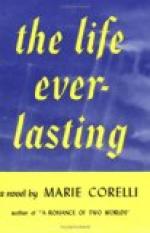ARROGANT ASCETICISM
“The ascetic is a blasphemer of God and of the work for which God alone is responsible. By withdrawing himself from the world of men he withdraws himself from human sympathy. By chastising the body and its natural emotions and desires, he chastises that which God has made as a temple for his soul to dwell in. By denying the pleasures of this world, he denies all the good which God has prepared and provided for him, and he wrongs the fair happiness of Nature and the order in which the Universe is planned. The so-called ‘religious’ person who retires into a monastery, there to pray and fast and bemoan the ills of the flesh, is an unnatural creature and displeasing to his Maker. For God looked upon everything He had made and found it ‘good.’ Good—not bad, as the arrogant ascetic would assume. Joy, not sorrow, should be the keynote of life—the world is not a ‘vale of tears’ but a flower-filled garden, basking in the perpetual sunshine of the smile of God. What is called ‘sin’ is the work of Man—God has no part in it. ‘By pride the angels fell.’ By pride Man delays his eternal delight. When he presumes to be wiser than his Creator,—when he endeavours to upset the organisation of Nature, and invents a kind of natural and moral code of his own, then comes disaster. The rule of a pure and happy life is to take all that God sends with thankfulness in moderation—the fruits of the earth, the joys of the senses, the love of one’s fellow-creatures, the delights of the intellect, the raptures of the soul; and to find no fault with that which is and must ever be faultless. We hear of wise men and philosophers sorrowing over ’the pain and suffering of the world’—but the pain and suffering are wrought by Man alone, and Man’s cruelty to his fellows. From Man’s culpable carelessness and neglect of the laws of health




